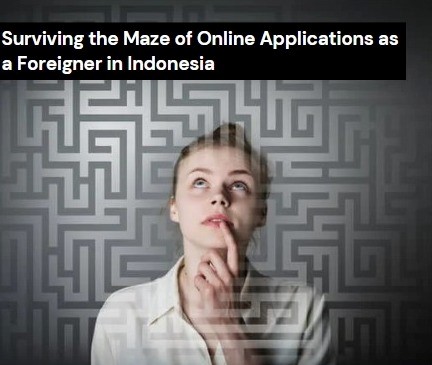How to survive the fearmongering in Indonesia as a foreigner in 2025.
Living in paradise comes with a price, and no, we’re not talking about diverse culture, friendly locals, or friendly grocery prices. In recent months, Indonesia has made it crystal clear: compliance is no longer optional. Whether you’re working remotely from a villa in Canggu, running your own consulting firm in Jakarta, building your own villa and renting it out privately for a few weeks or months, or simply enjoying your retirement dream in Ubud — you need to be on the right side of the law.
Unfortunately, too many expats are learning this the hard way. And that is so sad!
This isn’t just a Bali problem or a Jakarta crackdown — it’s nationwide. So, if you’re still thinking, “Don’t worry, they’ll never check”, you’re in for a bureaucratic ride. Those days are gone!
Recent Reality Checks
Let’s look at just a few headlines from the past few months:
Russian DJ (May 2024) — Deported for performing on a tourist visa.
British Yoga Instructor (April 2024) — Exposed on social media, detained and deported.
Australian Retiree with Investor ITAS (April 2025) — Built his own villa, then rented it out privately for short-term stays via social media. Immigration revoked his ITAS.
Chinese Businessman (March 2024) — Running an illegal online gambling site on a business visa.
19 Overstayers (February 2024) — Caught in a Bali raid, blacklisted.
French Digital Nomad (January 2024) — Working remotely on a tourist visa. Visa revoked after laptop check.
8 Nigerian Nationals (December 2023) — Fake permits and scams. Escorted out.
Notable changes can be seen in the tightening of the Indonesian authorities, as the Immigration, Manpower, the Investment Coordination Board (Badan Koordinasi Penanaman Modal or BKPM), and the Tax Office are now working together under a “One System” approach. They’re cross-checking your visa, work permits, business filings, bank transactions, and even your social media posts if they go viral and you’re not careful. (See and read the insightful article by Seven Stones Indonesia in the April edition of this magazine.)
If something doesn’t line up, like working as a freelance designer on a tourist visa or reporting zero income in your Penanaman Modal Asing (PMA) while living lavishly, they’ll notice. And they’ll act.
We all know the old saying, “When in Rome, do as the Romans do.” And that surely applies when you’re staying in Indonesia. With these tightened policies, expats need to stay alert to these key points to keep themselves from being detained by the authorities: The first one is, of course, one of the basic rules: never overstay your visa, even by a few days. Second, even when Indonesia is warmly welcoming foreign workers, do not work without a KITAS, even under a tourist or social visa. You are also not allowed to run a business on the wrong structure, like using a nominee setup improperly. And when you do work or set up a business in Indonesia, earning income in Indonesia without reporting taxes is a ticket to being interrogated by the authorities. And lastly, underestimating digital footprints — yes, they do check laptops and social media — especially when your posts go viral. Advertise on Facebook that you want to rent out your own self-built villa for a few months — but you don’t have a Pondok Wisata permit — and you are done.
Never Assume You’re Invisible
Immigration now checks cafes, co-working spaces, villa rentals, and even wedding ceremonies. They scroll your viral social media posts, go through your laptop, and talk to your landlord. This is not fearmongering the public. It is reality.

If you don’t want to end up being a hot topic on the evening news of Indonesian television or being viral across social media (all for the wrong reasons, obviously), be compliant.
- Get the right visa — If you work, invest, or volunteer, you need more than a Visa on Arrival (VOA) or a social visit visa;
- Match your paperwork to reality — Your job title, business activity, and visa must align. If you’re an expat who is working remotely, follow the visa E33G requirements (income abroad > US$60,000);
- File your taxes properly — Stay longer than 183 days? You’re a tax resident, whether you like it or not;
- Declare foreign income — Yes, even your online gigs;
- Avoid nominee traps — If you’re the real owner, document it. Who is the Ultimate Beneficial Owner (UBO)?
- Consult a pro — DIY legal fixes rarely end well here.
Final Thoughts
Indonesia remains one of the most welcoming countries in Southeast Asia — but like any home, it has house rules. Don’t get caught offside. Stay compliant, stay respectful, and, most of all, stay informed.
As one government official put it, “We are not hunting foreigners. We are just enforcing the law. And everyone must follow it.”
If in doubt, ask. A quick consultation can save you a deportation stamp and years of regret. Just ask Globy for an initial opinion and act when you are in doubt. There are enough trustworthy and reliable consultants, lawyers, and agents with good knowledge out there. Even Globy can mention a few, so don’t hesitate to ask. Furthermore, Globy will not just mention The Permit House, as we only guide and assist. However, we can forward or suggest to you a law firm, a notary, or even another consultant or agent — when we feel that is your best step.





